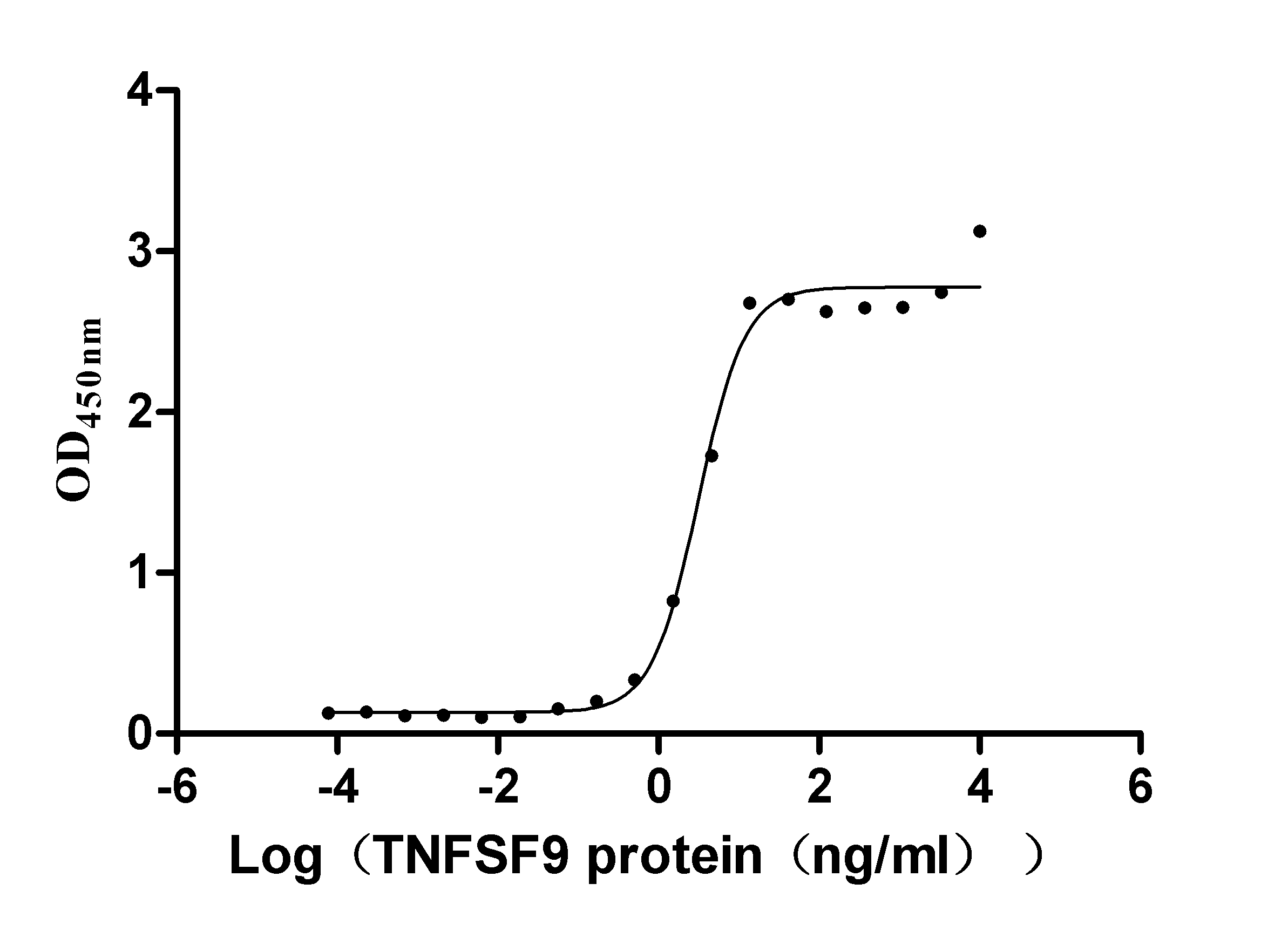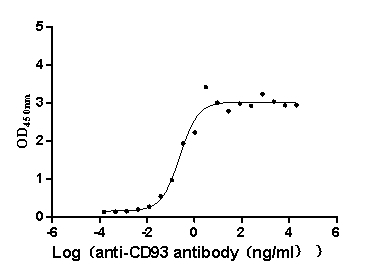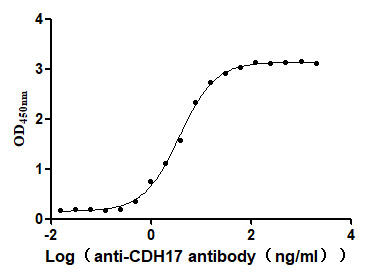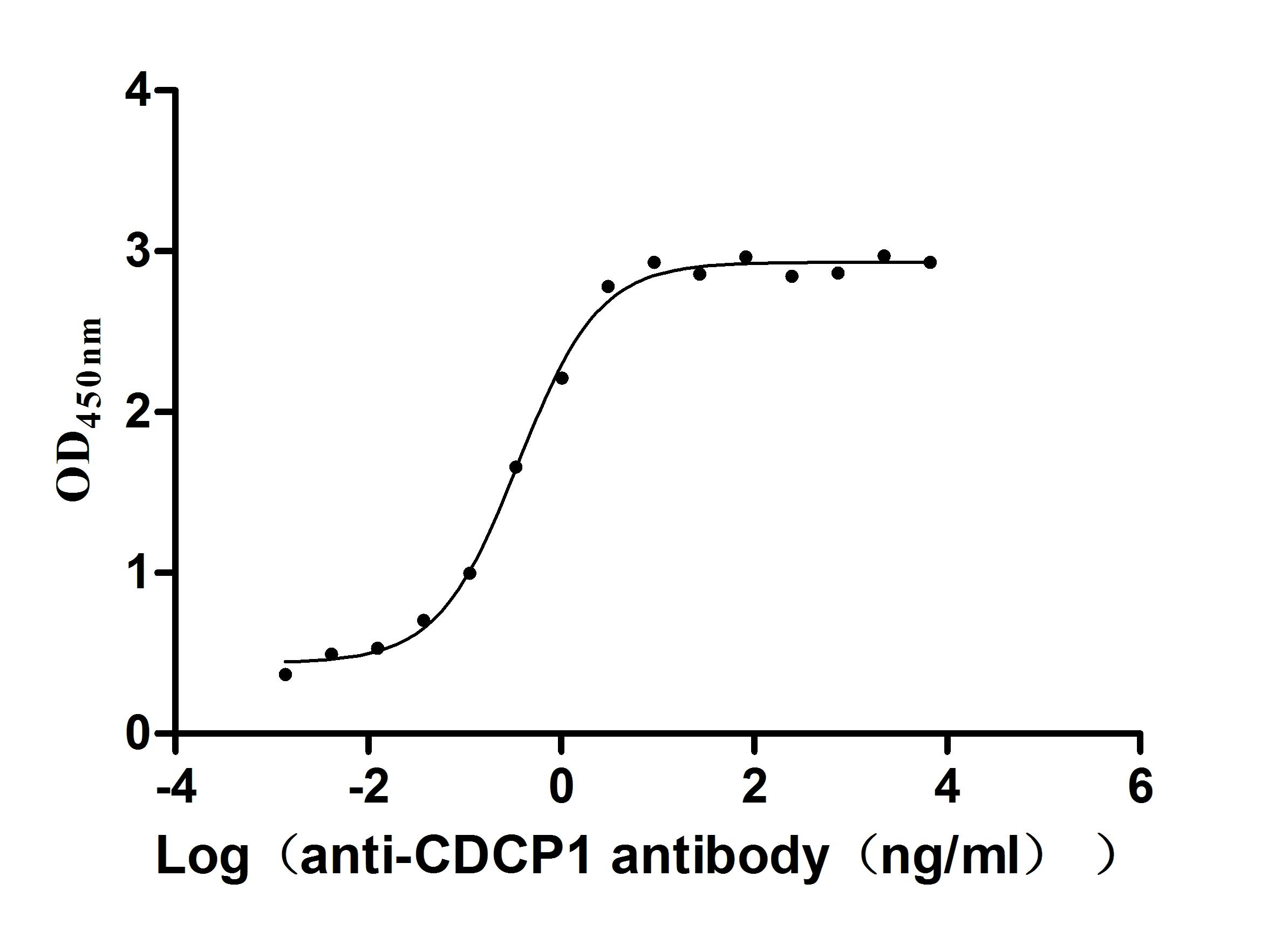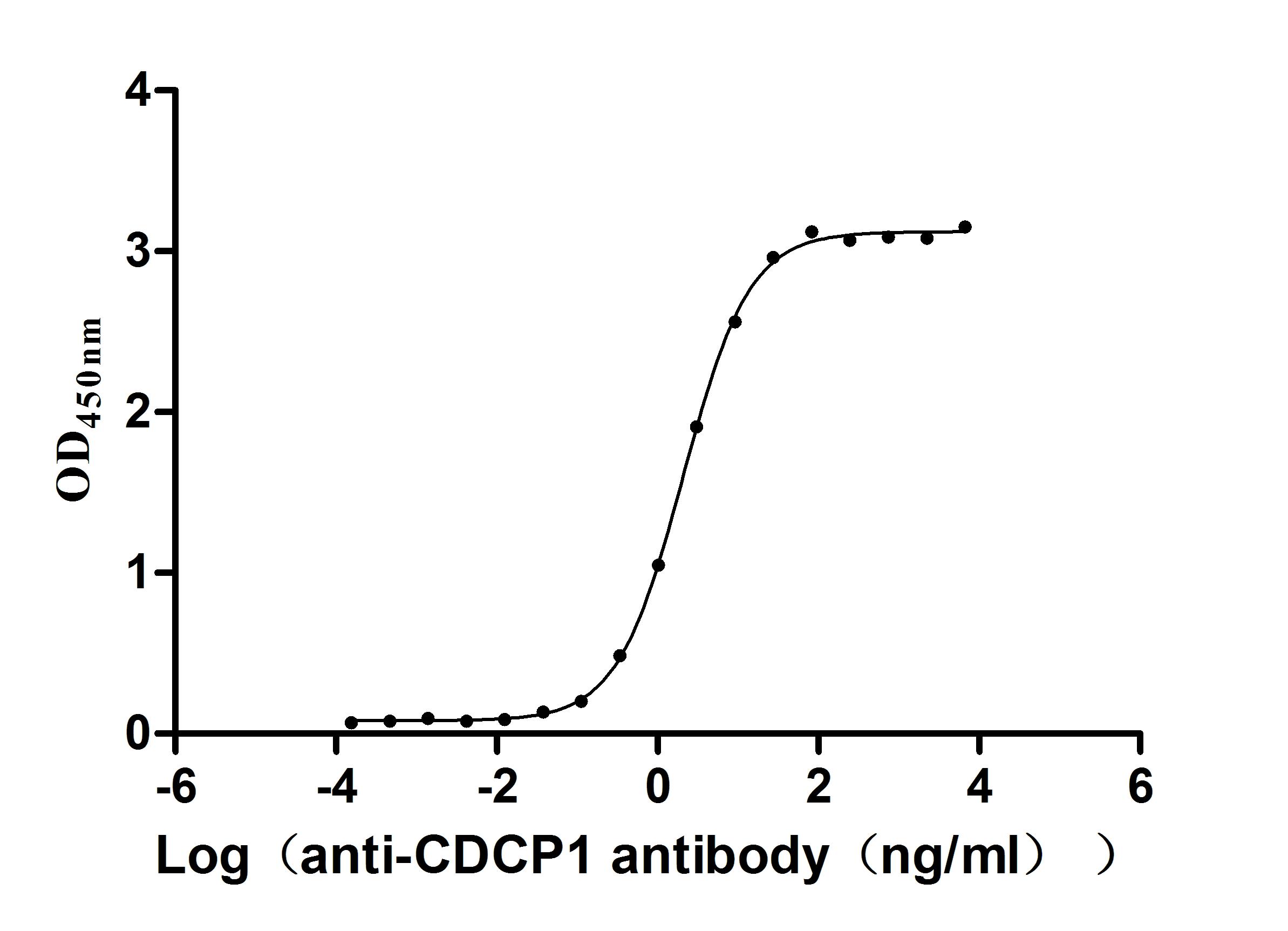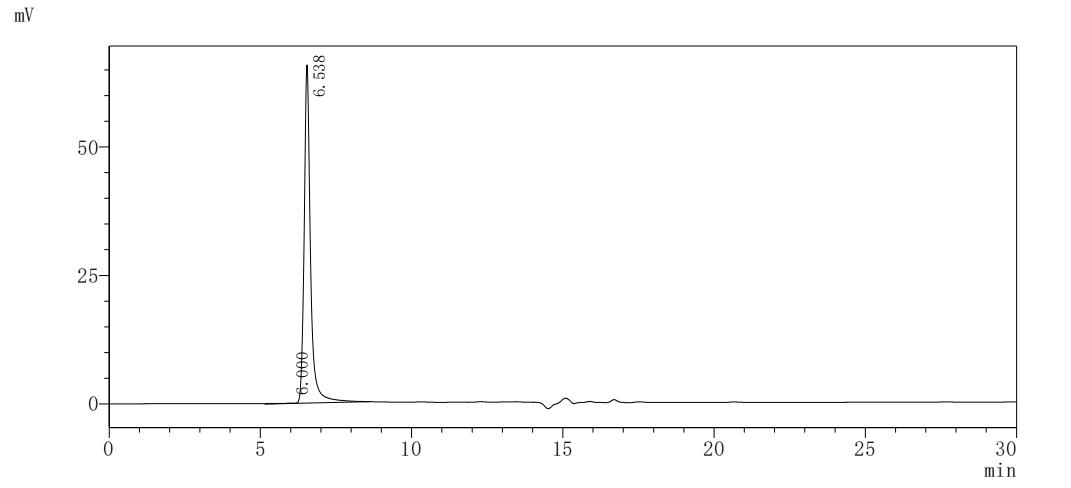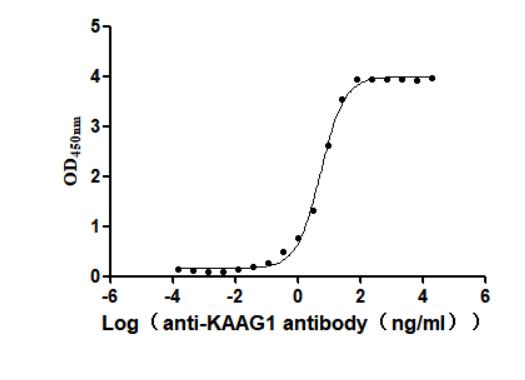Recombinant Human Delta-type opioid receptor (OPRD1), partial
-
货号:CSB-YP016358HU1
-
规格:
-
来源:Yeast
-
其他:
-
货号:CSB-EP016358HU1
-
规格:
-
来源:E.coli
-
其他:
-
货号:CSB-EP016358HU1-B
-
规格:
-
来源:E.coli
-
共轭:Avi-tag Biotinylated
E. coli biotin ligase (BirA) is highly specific in covalently attaching biotin to the 15 amino acid AviTag peptide. This recombinant protein was biotinylated in vivo by AviTag-BirA technology, which method is BriA catalyzes amide linkage between the biotin and the specific lysine of the AviTag.
-
其他:
-
货号:CSB-BP016358HU1
-
规格:
-
来源:Baculovirus
-
其他:
-
货号:CSB-MP016358HU1
-
规格:
-
来源:Mammalian cell
-
其他:
产品详情
-
纯度:>85% (SDS-PAGE)
-
基因名:
-
Uniprot No.:
-
别名:OPRD1; OPRD; Delta-type opioid receptor; D-OR-1; DOR-1
-
种属:Homo sapiens (Human)
-
蛋白长度:Partial
-
蛋白标签:Tag type will be determined during the manufacturing process.
The tag type will be determined during production process. If you have specified tag type, please tell us and we will develop the specified tag preferentially. -
产品提供形式:Lyophilized powder
Note: We will preferentially ship the format that we have in stock, however, if you have any special requirement for the format, please remark your requirement when placing the order, we will prepare according to your demand. -
复溶:We recommend that this vial be briefly centrifuged prior to opening to bring the contents to the bottom. Please reconstitute protein in deionized sterile water to a concentration of 0.1-1.0 mg/mL.We recommend to add 5-50% of glycerol (final concentration) and aliquot for long-term storage at -20℃/-80℃. Our default final concentration of glycerol is 50%. Customers could use it as reference.
-
储存条件:Store at -20°C/-80°C upon receipt, aliquoting is necessary for mutiple use. Avoid repeated freeze-thaw cycles.
-
保质期:The shelf life is related to many factors, storage state, buffer ingredients, storage temperature and the stability of the protein itself.
Generally, the shelf life of liquid form is 6 months at -20°C/-80°C. The shelf life of lyophilized form is 12 months at -20°C/-80°C. -
货期:Delivery time may differ from different purchasing way or location, please kindly consult your local distributors for specific delivery time.Note: All of our proteins are default shipped with normal blue ice packs, if you request to ship with dry ice, please communicate with us in advance and extra fees will be charged.
-
注意事项:Repeated freezing and thawing is not recommended. Store working aliquots at 4°C for up to one week.
-
Datasheet :Please contact us to get it.
相关产品
靶点详情
-
功能:G-protein coupled receptor that functions as receptor for endogenous enkephalins and for a subset of other opioids. Ligand binding causes a conformation change that triggers signaling via guanine nucleotide-binding proteins (G proteins) and modulates the activity of down-stream effectors, such as adenylate cyclase. Signaling leads to the inhibition of adenylate cyclase activity. Inhibits neurotransmitter release by reducing calcium ion currents and increasing potassium ion conductance. Plays a role in the perception of pain and in opiate-mediated analgesia. Plays a role in developing analgesic tolerance to morphine.
-
基因功能参考文献:
- During prolonged hypoxia/ischemia delta-opioid receptor (DOR) neuroprotection involves a variety of signaling pathways. The data suggest that DOR may display its neuroprotective role via the BDNF-TrkB pathway. [review] PMID: 29768254
- Site-specific O-glycosylation of N-terminal serine residues by polypeptide GalNAc-transferase 2 modulates human delta-opioid receptor turnover at the plasma membrane. PMID: 29097258
- OPRD1 gene variants and their haplotypes can play important roles in susceptibility to opioid dependence. PMID: 28632076
- Homozygotes AA at rs6265 (BDNF), TT at rs16917234 (BDNF), and CC at rs508448 (OPRD1) also appeared as risk factors for the endophenotype earlier age of onset for heroin use. PMID: 28692418
- Di-lysine binding motifs within the second and third intracellular loops of DOPr are involved in the interaction with COPI. PMID: 28041939
- Functional activity of Dynorphin 1-17 and fragments (1-6, 1-7 and 1-9) were screened over a range of concentrations against forskolin stimulated human embryonic kidney 293 (HEK) cells stably transfected with one of KOP, MOP or DOP PMID: 28049031
- A polymorphism in OPRD1 appears to be associated with both cocaine dependence and cocaine use during treatment in African-Americans. Follow-up studies to confirm the effect on cocaine use are warranted. PMID: 27449273
- OPRD1 promoter hypermethylation is associated with the risk of AD PMID: 28253273
- This review addresses Delta Opioid receptors from the perspective of cellular and molecular determinants of their pharmacological diversity. PMID: 27343248
- After inhibition of the PKC/ERK signalling pathway, the effects of DOR on breast cancer were significantly attenuated in vivo and in vitro. In summary, DOR is highly expressed in breast cancer and is closely related to its progression. These results suggest that DOR may serve as a potential biomarker for the early diagnosis of breast cancer and may be a viable molecular target for therapeutic intervention. PMID: 27665747
- The study successfully developed a population PKPD model for oxycodone across three experimental pain types and investigated the association between 18 SNPs across all three opioid receptor genes (OPRM1, OPRK1, OPRD1) and analgesic response from oxycodone. None of the selected polymorphisms were significantly associated with analgesic response of oxycodone. PMID: 26946441
- the expression of DOR was upregulated in the drugresistant human hepatocellular carcinoma cells. PMID: 26549838
- OPRD-mediated activation of ERK1/2 is via ligand-specific transactivation of EGFR. PMID: 26211551
- Results suggest deltaOR-Phe27Cys variation modulates beta- and gamma-secretase activity in late-stage Alzheimer's disease likely via post-translational mechanisms PMID: 26402014
- findings suggest that SNPs in opioid receptors and the PNOC genes are associated with NAS severity. PMID: 26233486
- Activation of the delta opioid receptor promotes cutaneous wound healing by affecting keratinocyte intercellular adhesion and migration PMID: 24628261
- Analysis of the transcription factor POU2F3 revealed a DOPr-mediated extracellular signal-regulated kinase (ERK)-dependent downregulation of this factorThe delta-opioid receptor affects epidermal homeostasis PMID: 25178105
- findings suggest that rs581111 and rs52920 may be useful when considering treatment options for female opioid addicts, however, confirmation in an independent sample is warranted PMID: 24126707
- OPRD1 rs678849 polymorphism was associated with reduced brain volumes in young participants and elderly Alzheimer's Disease and Mild Cognitive Impairment patients, but brain regions affected differed PMID: 23427138
- Taken together, the hdeltaOR appears to rely primarily on the CNX-mediated N-glycan-dependent QC that has the capacity to assist in folding PMID: 24798333
- OPRD1 polymorphisms are associated with risk for heroin dependence. PMID: 22500942
- Some variants less known for obesity-susceptibility such as OPRD1 were found to be associated to weight with strongest effects in males. PMID: 23318717
- DOR is highly expressed in HCC and is involved in HCC progression, suggesting that DOR is a potential target for HCC treatment PMID: 23903826
- crystal structure of the human delta-opioid receptor (delta-OR), revealing the presence and fundamental role of a sodium ion in mediating allosteric control of receptor functional selectivity and constitutive activity PMID: 24413399
- The levels of spontaneous and ligand-induced receptor-G protein coupling in delta (DOP) and mu (MOP) opioid receptors, was examined. PMID: 23836900
- Polymorphisms in OPRD1 are relevant for cocaine addiction in the African American population and support a broad role for OPRD1 variants in drug dependence. PMID: 22795689
- delta and mu-opioid receptors, but not kappa-opioid receptors, are functional in the neuronally stimulated longitudinal human vas deferens PMID: 22752269
- SNPs rs569356 in OPRD1 (variant A1968G in the promoter region) was not associated with respiratory syncytial virus infection PMID: 23222260
- no differences in DOR mRNA levels were seen in schizophrenia. PMID: 21810780
- between CBR and delta opioid receptor PMID: 22235275
- ssarrestin1 is exclusively involved in human delta-opioid receptor desensitization PMID: 22101011
- Cys-27 variant of human delta-opioid receptor modulates maturation and cell surface delivery of Phe-27 variant via heteromerization. PMID: 22184124
- study confirmed that common single-nucleotide polymorphisms (SNPs) within OPRD1 confer risk for AN. PMID: 21079607
- suggest that aging individuals with at least one human delta opioid receptor(hdeltaOR)(Cys27) encoding allele might have lowered threshold for Ca(2)+ dysregulation in neurons expressing hdeltaOR PMID: 21234650
- Data suggest that muOR exists primarily as a dimer that will oligomerize with deltaOR into tetramers, and morphine promotes the dissociation of these tetramers. PMID: 21361347
- data suggest that an increased constitutive internalization and/or concurrent signaling of the delta-opioid receptor-Cys27 variant affects APP processing through altered endocytic trafficking of APP PMID: 21464208
- Results suggest that the minor G-allele of SNP rs569356 may enhance transcription factor binding and increase OPRD1 expression. PMID: 20300121
- human delta opioid receptor (hdeltaOR) exists in a ternary complex with SERCA2b and the ER molecular chaperone calnexin PMID: 20528919
- A molecular mechanism for the formation of a DOR/secretase complex that regulates the specificity of secretase for Amyloid beta production. PMID: 20066010
- Intrinsic cardiac adrenergic cells constitute a delta-opioid-regulated adrenopeptidergic paracrine system conferring robust cardioprotection through beta(2)-AR/CGRP-R co-signalling. PMID: 19581316
- These results suggest that oligomerization of chemokine receptor CCR5 and opioid receptors mu, delta and kappa on the cell membrane of human or monkey lymphocytes may modulate receptor functions. PMID: 12413885
- Gene may be linked to etiology of anorexia nervosa. PMID: 12740597
- random mutagenesis identified 30 activating point mutations. 3-D modeling revealed an activation path originating from the third extracellular loop and propagating through tightly packed helices III, VI and VII down to a VI-VII cytoplasmic switch. PMID: 12847517
- protein conformation and binding site for deltorphin ii PMID: 14999000
- interaction studies between the delta-opioid receptor, ligands, and G-proteins PMID: 15317820
- investigation of the ability of different opioid receptors to regulate the phosphorylation and degradation of tuberin PMID: 16053916
- Results describe the residues of the transmembrane helices 7 of delta and kappa opioid receptors that are on the water-accessible surface of the binding-site crevices. PMID: 16331961
- Results suggest that the OPRD1 gene variants may not be a factor in vulnerability to methamphetamine dependence/psychosis. PMID: 16741914
- Changes in the inhibitory effects of opioid receptor agonists on intracellular cAMP were used as a marker of the function delta opioid receptors (delta receptor). PMID: 16808998
- pharmacological chaperones facilitate plasma membrane targeting of delta-opioid receptors by binding and stabilizing receptor precursors, thereby promoting their release from the stringent ER quality control PMID: 17550902
显示更多
收起更多
-
亚细胞定位:Cell membrane; Multi-pass membrane protein.
-
蛋白家族:G-protein coupled receptor 1 family
-
组织特异性:Detected in oocytes (at protein level). Detected in brain cortex, hypothalamus, hippocampus and olfactory bulb. Detected in oocytes.
-
数据库链接:
HGNC: 8153
OMIM: 165195
KEGG: hsa:4985
STRING: 9606.ENSP00000234961
UniGene: Hs.372
Most popular with customers
-
Recombinant Human Tumor necrosis factor ligand superfamily member 9 (TNFSF9), partial (Active)
Express system: Mammalian cell
Species: Homo sapiens (Human)
-
Recombinant Macaca fascicularis CD93 molecule (CD93), partial (Active)
Express system: Mammalian cell
Species: Macaca fascicularis (Crab-eating macaque) (Cynomolgus monkey)
-
Recombinant Human Cadherin-17 (CDH17), partial (Active)
Express system: Mammalian cell
Species: Homo sapiens (Human)
-
Recombinant Human CUB domain-containing protein 1 (CDCP1), partial (Active)
Express system: Mammalian cell
Species: Homo sapiens (Human)
-
Recombinant Macaca fascicularis CUB domain containing protein 1 (CDCP1), partial (Active)
Express system: Mammalian cell
Species: Macaca fascicularis (Crab-eating macaque) (Cynomolgus monkey)
-
Recombinant Human Cadherin-1(CDH1),partial (Active)
Express system: Mammalian cell
Species: Homo sapiens (Human)
-
Recombinant Human C-C chemokine receptor type 9 (CCR9)-VLPs (Active)
Express system: Mammalian cell
Species: Homo sapiens (Human)
-
Recombinant Human Kidney-associated antigen 1(KAAG1) (Active)
Express system: Baculovirus
Species: Homo sapiens (Human)


